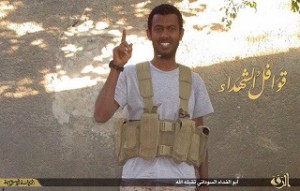The Sudanese authorities have re-arrested the Salafist Jihadist preacher and supporter of the Islamic State in Iraq and Syria (ISIS), Masa’ad al-Sidairah along with several of his disciples.
The National Intelligence and Security Services (NISS) arrested him and two others including the head of Jama’at al-I’tisam bil-Kitab wal-Sunnah (the group of adherents to the Quran and Sunnah), Omer abdel-Khalig and al-Shaikh Salah al-Din besides several of their followers.
Al-Sidairah is running a religious school in Shambat suburb in Khartoum North where he teaches Hadith (a collection of traditions containing sayings of the prophet Mohamed).
However the authorities see his institution as a recruiting centre for the youth who seek to join Jihadist movements including ISIS, the Somali militant group, al-Shabab and the Malian Ansar al-Din group.
Al-Sidairah had openly pledged allegiance to ISIS’ leader and the self-proclaimed Caliph, Abu Bakr al-Baghdadi, but he denies involvement in sending young people to Iraq and Syria to join the militant group.
ISIS presence in Sudan has made the headlines last March after British media outlets confirmed that nine medical students from Sudanese origins entered Syria via Turkey to work in hospitals under the control of ISIS. Also, last June, 12 other college students secretly left the country for Turkey to join ISIS.
The students are enrolled at the University of Medical Sciences and Technology (UMST) owned by the minister of health at the state of Khartoum Mamoon Humaida.
On 26 July 2014 Jama’at al-I’tisam bil-Quran wal-Sunna issued a statement signed by its former leader, Sulieman Abu Naro, pledging allegiance to al-Baghdadi and expressing support for the declaration of the Islamic Caliphate.
“We see in this event a great opportunity to unite Muslims and to strengthen their ranks in the battle against their enemies,” the statement read.
Also, the group, under its current leader, Abdel-Khalig, expressed its support to the terrorist attack against the offices of the French magazine Charlie Hebdo in Paris, last January in which 12 people were killed and 11 others injured.
It also supported the killing of the Royal Jordanian Air Force pilot, Muaz Kassasbe, who was burned to death by ISIS last February after his plane crashed over Syria.
It is worth pointing that al-Sidairah was released last January after he spent three months in detention against the backdrop of the demonstrations which broke out in protest of a cartoon satirizing Islam’s prophet Mohamed. He had also been detained at Cairo airport in 2009.
On 30 June, NISS re-arrested the general coordinator of the far-right One Nation Movement group and the openly supporter of ISIS, Mohamed Ali al-Gizouli.
He was released a few days earlier after spending 8 months in detention against the backdrop of accusations pertaining to his support for ISIS.
In May, Sudan’s minister of Higher Education Sumaya Abu-Kushawa accused unnamed circles of actively recruiting students to join ISIS.
At the time, Sudanese second vice-president Hassabo Abdel-Rahman blamed internal and external parties as well as international intelligence agencies for the phenomenon of extremism in the Arab and African communities.
Also, last July sources told Sudan Tribune that an ISIS cell comprised of three Middle Eastern men and an Eritrean were arrested by the Sudanese authorities in the coastal city of Port Sudan on 10 June.
ISIS announced that one of its Sudanese fighters nicknamed Abu al-Fida al-Sudani was killed in their stronghold of al-Riqa.



